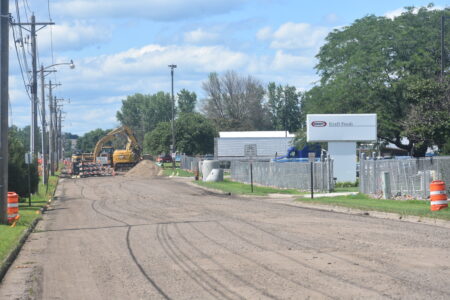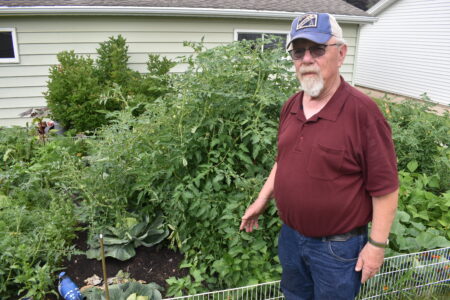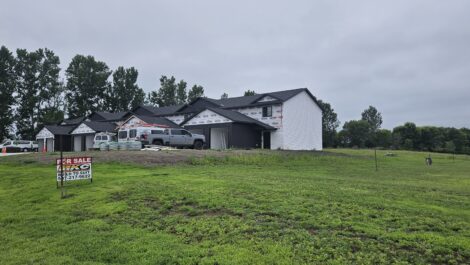Real trees, real memories
Evergreens ever popular at Guggisberg Tree Farm

Staff photo by Travis Rosenau Tony Guggisberg trims a Fraser tree at Guggisberg Tree Farm on 17703 Grandview Road in New Ulm. Guggisberg Tree Farm sold out of trees the first weekend after Thanksgiving this year as tree buyers look to get an early jump on the Christmas season.
NEW ULM — Artificial trees may be popular with some crowds around the holidays, but a fresh-cut Christmas tree never goes out of style.
New Ulm’s Tony Guggisberg already knew that, but it’s become more apparent over the past few years.
In addition to spending time working at the River Creek Nursery (RCN) in New Ulm, Guggisberg operates Guggisberg Tree Farm, a family-run, cut-your-own tree business on 17703 Grandview Road in New Ulm.
Guggisberg Tree Farm has been selling well-maintained spruce, fir and pine trees since 2006 and officially opened for the season this year the day after Thanksgiving.
Typically the tree farm would be open most weekends in December, but that’s not the case this year.

The Guggisberg family poses for a photo at Guggisberg Tree Farm. From left to right are the Guggisbergs: Matt, Megan, Marie, Jacob, Tony, Emily, Liz and Rachel.
Guggisberg Tree Farm sold out of trees the first weekend after Thanksgiving this year, with an estimated 500 trees being sold in total.
This is not the first time Guggisberg Tree Farm has had to close early for the season, though.
Having to predict a decade into the future is hard for anyone, and especially when a global shutdown is thrown into the mix.
“We had less trees because we have to plant 10 years from now what people are going to want,” Guggisberg said. “When COVID hit in 2020, a lot of people came out to get real trees just because they wanted something with the family since there were no sports to do or any other activities and this was an outside activity that they could still do and get people out and spend time together.
“We had so many people come that year, they ran us out of trees, and then what happened was that next year, people got a little worried, so they all came sooner. Now people are coming sooner trying to get trees because they’re afraid we’re going to run out again. So, that’s why it all comes now so fast at the beginning.”

Right: Tony Guggisberg and his daughter Liz shake a Scotch pine tree to remove old needles.
Numbers were also down this year due to three consecutive dry years, which has caused trees to grow slower.
Getting his tree farm open for business in 2006 was a process for Guggisberg also, as the first few trees were planted on the farm in 1994.
“It takes roughly eight to 10 years from the small seedlings we plant to get them ready for harvest,” Guggisberg said. “So eight to 10 years is roughly what it takes, depending on the type of tree. So we start them as young transplants and they’re usually in at 8 to 10 inches high.”
Guggisberg attended the University of Minnesota Waseca, and earned a degree in landscape/nursery before attending the University of Minnesota – St. Paul, acquiring a Bachelor of Science degree in environmental horticulture.
Guggisberg’s tree farm is rooted in his love of nature.
“I love nature, I love being outdoors,” Guggisberg said. “I enjoy trees, I love trees and gardening and anything that happens outside — nature. So, it just kind of fits. So, when people can’t find me, they know I’m outside somewhere. Even in winter, unless it’s really, really cold, I just love being outside. It’s so neat because it’s just fun watching things grow and develop.
“People sometimes say, ‘Aren’t you sad to see the trees get cut off?’ And I say, ‘I planted them for that reason.’ If I would just leave them grow, they’re so closely planted that they would all just die because they’d all grow into each other anyway.”
Guggisberg said there’s a lot involved to maintain the tree farm, such as watering, trimming and fertilizing.
“Some people think it all just happens a couple weeks in the fall,” he said. “But it starts in spring, we dig out the old stumps, we till all the ground and prepare the ground, then we have to plant them, then it’s watering throughout the summer, then trimming. It’s really a lot of work all season to get these trees. Most people don’t realize how much labor is involved in getting a nice Christmas tree to market.”
Guggisberg Tree Farm grows eight different varieties of trees: white pine, Scotch pine, Balsam fir, Fraser fir, Canaan fir, blue spruce, Black Hill spruce and Balsam-Korean fir hybrid. Those trees are planted across roughly 10 acres.
Guggisberg said one reason people are deterred from buying a real tree is concerns over cleanup. However, he said the Fraser and Canaan fir trees, along with the Balsam-Korean hybrid and white and Scotch pine trees, all hold their needles very well.
Guggisberg said his top selling trees are fir trees.
“People like them because they have short needles, so they’re easy to decorate,” he said. “And they’re soft and they still have a nice fragrance.”
And once the tree is cut, there’s more to it than just putting it up and decorating it.
“I always tell people that after the tree is cut, if they’re not going to put it up, put it in the shade, like behind their house or in an unheated shed,” Guggisberg said. “And before they put it up, they want to recut the bottom at least an inch off the tree to open up the sealed-off trunk, so it’ll take water up again. So, either they can cut it right away and put it in water, or they’ll have to recut it if they do not put it up that day.
“Then they want to keep it away from a heat source. I always tell people that it may look very beautiful next to the fireplace, but it’s the worst place to put it. It will dry your tree out very quickly. If you’re putting it close to a heat vent, just close the heat vent up so it’s not blowing warm air there.”
Guggisberg also said the main key to keeping the trees healthy is giving them water and making sure they don’t run dry.
“Some fresh trees can take up to a gallon a day, so you really want to watch that,” he said.
Guggisberg said most people purchasing a tree at his farm will choose to cut down trees between 6 and 9 feet tall for their house, but he has had some people cut down trees as tall as 20 feet.
For safety reasons, Guggisberg doesn’t allow people to use chainsaws to cut down trees at his farm, but he does provide a bow saw for use. The additional perk of using a tree shaker to remove dead needles and tidy up the tree before it’s bundled is also provided at the main building.
Despite the amount of time and work put into the farm, Guggisberg said he enjoys the memories he’s able to help others create.
“I’ve always said it’s a lot of work for the money you make on it,” Guggisberg said. “So, it isn’t always about trying to make some money on it, it’s about making memories and that’s the key here. People are so happy to come out here with their families and cut a tree. It’s just a tradition for them and they enjoy it every year. … It seems like the kids and the parents, they remember every year cutting that tree. They may not remember what they did yesterday, but they remember what tree they had and where they cut it from, so it’s just great making memories.”
Despite quickly selling out of trees this season, Guggisberg, his wife, Marie, and their six children Liz, Megan, Rachel, Matt, Jacob and Emily, will continue to keep Guggisberg Tree Farm thriving, producing trees and memories for years to come.
For more information, visit guggisbergtreefarm.com.
And while his tree farm may be closed for the season, Guggisberg has been spending his weekdays at RCN, co-operated by Guggisberg and Kevin Schweiss. Guggisberg brings around roughly 150 trees to RCN, located at 1200 South Front Street in New Ulm, during the holiday season.
RCN may be an alternative for those still looking for a Christmas tree, but trees are going fast. For availability questions, RCN can be reached at 507-354-6001 or tonyg@nutelecom.net.
- Staff photo by Travis Rosenau Tony Guggisberg trims a Fraser tree at Guggisberg Tree Farm on 17703 Grandview Road in New Ulm. Guggisberg Tree Farm sold out of trees the first weekend after Thanksgiving this year as tree buyers look to get an early jump on the Christmas season.
- The Guggisberg family poses for a photo at Guggisberg Tree Farm. From left to right are the Guggisbergs: Matt, Megan, Marie, Jacob, Tony, Emily, Liz and Rachel.
- Right: Tony Guggisberg and his daughter Liz shake a Scotch pine tree to remove old needles.









